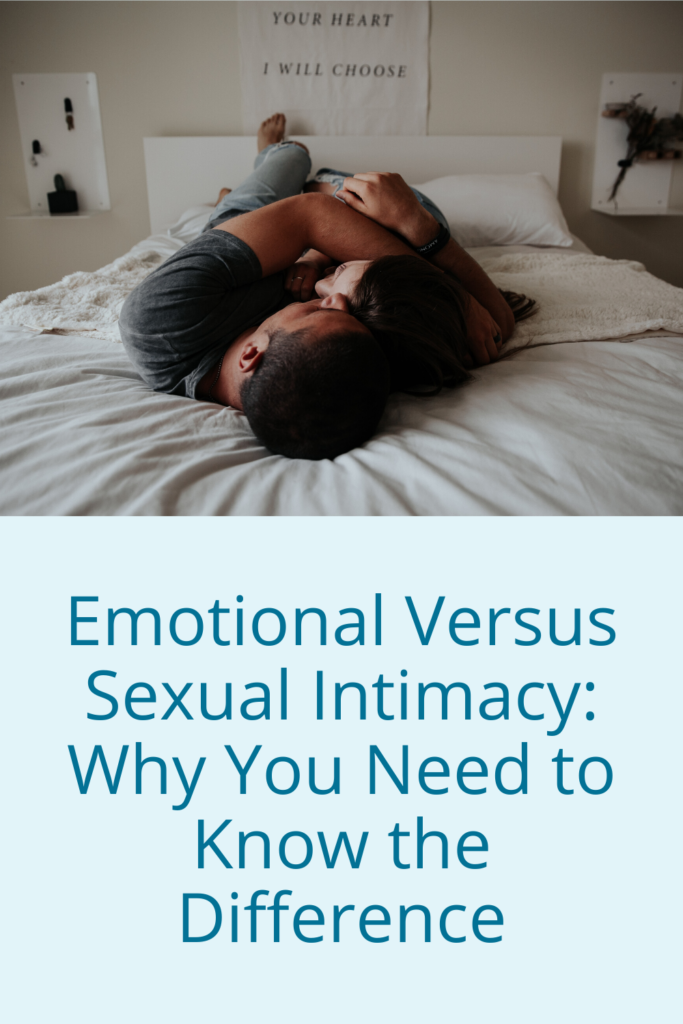Emotional Versus Sexual Intimacy: Why You Need to Know The Difference
June 1, 2020
As a young adult, were you ever told that there’s a difference in emotional intimacy and sexual intimacy? If you figured it out early in your life, you’re one of the few lucky ones.

The majority of us spend most of our lives without ever realizing that there is a difference.
We sacrifice our emotional selves, trying to connect in relationships based on what we can sexually provide. We experience hurt, pain, and many unhealthy relationships. Until we realize something is missing, and that something is emotional intimacy.
I spent many years and relationships, not realizing the difference and thinking that sex and emotional connection were the same. So if someone wanted to have sex with me, it meant they liked me. In reality, it meant that they just wanted sex and nothing more.
I had a lot to learn, and it wasn’t until I stumbled into a relationship with a healthy partner, that I realized that emotional and sexual intimacy was different. Also, my emotional and sexual needs were valid. So, I wanted to share what you need to know about emotional versus sexual intimacy.
They are not the same
You’re not surprised, right? It’s why you’re probably reading this blog in the first place.
You know they are different but, have you stopped to figure out what this means for you? You deserve to get your emotional and sexual needs met, which means you’re responsible for identifying them.
Keep in mind that my definition of emotional and physical intimacy may be different than yours, which is normal because we have had our own experiences.
Think of emotional intimacy as what helps us feel safe, secure, and trusting. Sexual intimacy is the pleasurable physical connection created from feeling safe, secure, and trusting with our partners.
Even though they satisfy two different parts of our soul, they work together to help us feel whole. Regardless of where you are in your relationship or if you’re single, now is a great time to understand these parts of yourself.
We need both
We need both emotional and sexual intimacy in balance to meet our needs. Before you get too deep in your head overthinking, if you really need both, keep reading.
Sexual intimacy doesn’t mean you have to swing from the chandeliers during sex, that you have to say yes every time your partner wants sex, or that you have to desire sex to be sexually intimate.
Think of it simply as the pleasurable connection you have with yourself or your partner. Every one of us needs to be connected with our sexual selves to live a fully desired life. So, to connect with our emotional intimacy, we must recognize sexual intimacy.
They work together
When was the last time you felt connected with your partner? That feeling of safety and security in your relationship.
Think of intimacy as ‘connection,’ so when trust is really good in your relationship, you feel emotionally connected to them. When trust is high, then intimacy is high. The result is that you feel intimately connected with your partner, so you’re emotionally and sexually connected with them.
When you get your emotional needs met, you’re going to be more able and willing to connect sexually. High trust equals high intimacy (emotionally and sexually).
Also, the opposite can happen. When there is a decrease in trust, your emotional and sexual intimacy decreases. When your trust in your partner changes, so does your connection with them, both emotionally and sexually.
Our awareness of emotional needs will be the first step to connect with our sexual needs. The problem is that your partner may not see the connection between emotional and sexual intimacy. Break it down for them, so they understand your needs.
Your partner wants you to feel satisfied, happy and connected in the relationship. They also prefer quality over quantity, which is the opposite of what you think.
They would rather you be present and active during sex once a week versus having sex several times a week with you just there existing. Emotional and sexual intimacy work together because it ensures both people get their needs met.
Realizing the difference between emotional and sexual intimacy is just the start. By identifying your needs and talking with your partner about them, you’ll see your relationship begin to change because both of you are committed to building your connection.
RESOURCES
FYF PODCAST
WORK WITH ME
RELATIONSHIP BLOG
BOOKS
THE FIX
Subscribe to get our latest content by email.